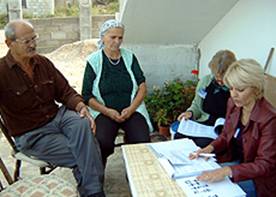|
|
Families Provide Important Clues in Search for the Missing
The International Committee of the Red Cross
December 2005

Mejra and Osman Camo talking with members of the team collecting ante-mortem data and the ICRC representative
A countrywide campaign to collect additional information from families that still have relatives missing due to the war in Bosnia-Herzegovina has just drawn to a close. The campaign, jointly carried out by the ICRC, the Red Cross Society of Bosnia-Herzegovina and associations representing the families of the missing, focused on gathering ante-mortem data -- information about the missing and the circumstances of their disappearance that could help in the identification of thousands of mortal remains found throughout the country.
Over the past months, some 200 Red Cross volunteers and about 50 members of the family associations contacted more than 12,000 families with missing relatives. The ICRC estimates that the fate of more than 16,600 missing persons remains unknown nearly a decade after the end of the war that devastated Bosnia-Herzegovina. The ante-mortem data gathered is checked by forensic experts against the findings obtained during the exhumation of mortal remains. The ante-mortem data combined with the results of DNA analysis allows the reliable identification of the mortal remains discovered and can therefore make it possible finally to inform families about what happened to their missing loved ones.
The campaign to collect ante-mortem data was carefully planned. The Red Cross volunteers taking part were trained to support the concerned families as they go through the painful process of remembering their last encounter with their missing relatives. Some 600 families also accepted the psychological support offered by the Red Cross.
In parallel, the ICRC has begun working with a number of national Red Cross societies throughout Europe, North America and in Australia to contact families from Bosnia Herzegovina that have resettled in these countries. The ante-mortem data collected will be added to the database compiled by the ICRC in Bosnia-Herzegovina.
The reactions by the families met by the Red Cross clearly illustrate that even many years after the end of the war their hopes of finding out what happened has not vanished. These families have a right to know what happened to their missing loved ones.
Sanela Bajrambasic of the ICRC's Sarajevo office met one of the concerned families.
The last time Mejra and Osman Camo saw their son, Alija, was in May 1993 when he came home in the evening from the Vranica barracks of the 4th Army corps in Mostar. 28-year old Alija, a taxi driver turned soldier, asked his mother to wash his uniform but in truth he also wanted to feel the comfort and reassurance of being at home. "He told us that the next day he would come with a friend for dinner. He wanted me to prepare something nice," remembers Mejra.
The next evening Osman and Mejra were watching TV as they were waiting for Alija and his friend to arrive for what would have probably been no more than a modest soup. Like their neighbours they would often watch the TV channel controlled by the opposite side in the conflict, just to find out what was going on. Imagine how they felt when they suddenly saw images of their son, Alija, his friend and ten others as they were taken away from Vranica by enemy troops, their hands tied above their heads.
Eleven years have passed since that fateful evening but for sixty-three year old Osman and his wife, Mejra the wait feels much longer. They have four daughters but Alija is their only son. Despite the interminable wait, they cling to the hope that Alija may still be alive. "I went to see all of them - priests, imams and fortune tellers," says Mejra. "They all said Alija is still alive."
They still remember every single item of clothing he wore that day and they showed me his shoes which they had kept for all these years. Yet despite their hopes they realise that Alija's body is probably among the thousands of unidentified mortal remains found across the country.
Pathologists will now use the information provided by Osman and Mejra when analysing the bones found in mass and individual graves. Since they both also agreed to give blood the specialists will be able to run a DNA analysis. Maybe there is a chance that Alija's remains will be found and that Osman and Mejira will at last know what happened to their beloved son.
|
|



